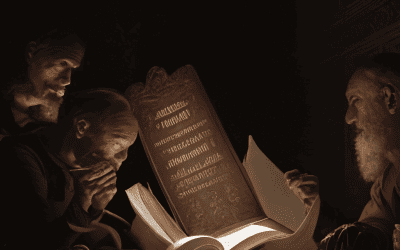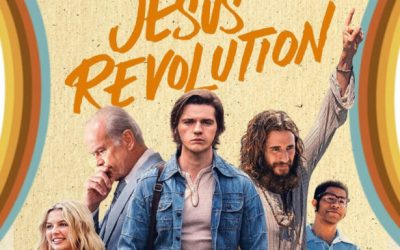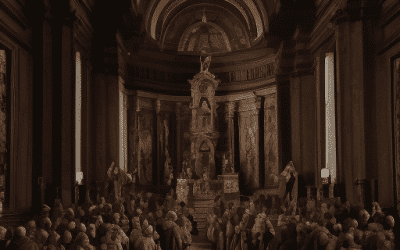By William H. Benson
The Parallel Lives
Of The NOBLE AMERICAN RELIGIOUS THINKERS AND BELIEVERS:
Roger Williams VS. Cotton Mathers
NEW ARTICLES
Battle of the Blue Water
Anthropologists divide the Lakota Sioux into seven bands. One band is called the Brulé or the Sicangu, or the Burnt Thighs. In August of 1854, a village of the Brulé people, led by chief Conquering Bear, were encamped along the North Platte River just into Wyoming.
One day, a cow that belonged to a Mormon settler wandered into the Brulé camp and one of the band’s warriors, High Forehead, shot and killed the cow. He wanted to eat steak.
Conquering Bear rode the ten miles to Fort Laramie, Wyoming, midway between Lingle and Guernsey, Wyoming, and offered a horse to the Mormon settler as compensation for his cow.
Lieutenant John Grattan, 24-years-old and fresh out out West Point, was determined to arrest High Forehead. He and 29 soldiers marched to the Brulé camp, and demanded the warrior.
One U.S. Army soldier panicked and fired a first shot. The Brulé warriors surrounded Grattan and the other 29 soldiers and shot them. Conquering Bear also was killed during the melee.
In November of 1854, three Brulé warriors assaulted a mail coach near Fort Laramie, and killed three white men, taking the coach’s gold.
The Brulé, now led by Chief Little Thunder, headed east into Nebraska to hunt buffalo.
Reports of these two incidents enraged government officials back east. President Franklin Pierce assigned Brigadier General William S. Harney to lead an attack upon the Lakota Brulé.
Blue Water Creek begins in central Garden County, Nebraska, and runs more or less straight south until it joins the North Platte River just west of Lewellen, Nebraska. North of that junction a mere three or so miles is where the Lakota Brulé were encamped in early September 1855.
A sixteen-page article, with text and colored pictures about the Battle of Blue Water, appeared last November in the magazine, the Smithsonian, published by the Washington D.C. museum.
Tim Madigan, the article’s author, wrote,
“Some 40 tepees, home to about 200 people, stood beside the water. Women would have been at work tanning hides for tepees, moccasins, shirts, and breeches, and drying and curing meat for the coming northern winter. Warriors would have seen to weapons and horses.”
On September 3, the Lakota Brulé women and men looked to the southern horizon and saw General Harney and his troops riding their way. Fearing for their lives, the women pulled down their tepees, grabbed their buffalo hides and cured meat, and fled north.
Chief Little Thunder negotiated with Harney, but the General ordered his soldiers to attack.
By accounts written later, the Battle of Blue Water was a massacre, for 86 Lakota Brulé men, women, and children were killed, but only four U.S. Army soldiers.
A 25-year-old officer and West Point graduate named Lieutenant Gouverneur K. Warren, a mapmaker who did not take part in the attack, recorded in his diary the atrocities he witnessed.
“After getting to camp I dressed their wounds. The feeling of sympathy for the wounded women and children and deep regret for their being so, I found universal. It could not be helped.”
At the massacre’s site, Warren collected dozens of Brulé handcrafted items, including dolls, moccasins, buckskin pants, feather bonnets, and war shirts, taken “from the bodies of the slain.”
He carried the artifacts back east in 1856, and donated the 69 items to the Smithsonian.
In recent years, the descendants of Chief Little Thunder—Karen, Phil, and Harry Little Thunder—have asked Smithsonian officials to return the Warren donations to the Lakota people.
On August 27, 2025, Tim Madigan wrote a followup article for the Smithsonian and reported that Smithsonian officials turned over the Warren donations to the Lakota people during that last week of August, just over two weeks ago, in time for the 170th anniversary of the Battle.
For the next two years, the Lakota will store the donations in a building atop a hill at the Ash Hollow State Historical Park, perhaps a dozen miles south of the battle site, until “the Lakota people decide their ultimate disposition. Only the Lakota will have access to them.”
The discovery near Motza, Israel
The main highway running east to west across Israel’s width is Highway One. It connects Tel Aviv and Jerusalem to the Jordan River Valley, near Jericho.
In 2012, highway contractors working 5 kilometers west of Jerusalem near the town of Motza uncovered a Neolithic town, home to perhaps 3,000 people at one time.
A new thing, an interstate highway, led to a discovery of an old thing, a town.
Tel Motza is now the largest Neolithic site in Israel. Archaeologists define a Tel as “a mound or small hill that has built up over centuries of occupation.” Excavators dig down through the layers until they find a bottom layer.
Archaeologists uncovered stone tools made of flint—arrowheads, axes, sickle blades, and knives—as well as human bones, clay figurines, grain silos, and a temple.
Books and censorship
The list of banned, censored, and challenged books is long and illustrious.
“Decameron” (1353) by Giovanni Boccaccio, and “Canterbury Tales” (1476) by Geoffrey Chaucer were banned from U. S. mail because of the Federal Anti-Obscenity Law of 1873, known as the Comstock Law.
That law “banned the sending or receiving of works containing ‘obscene, ‘filthy,’ or ‘inappropriate’ material.
William Pynchon, a prominent New England landowner and founder of Springfield, Massachusetts, wrote a startling critique of Puritanism, that he mailed to London and had it published there in 1650. He entitled it “The Meritorious Price of Our Redemption.”
A summer’s day
Popular song writers will, on occasion, dub into their lyrics references to summer.
In 1970, Mungo Jerry sang, “In the summertime, when the weather is high, you can stretch right up and touch the sky.” In 1972, Bobby Vinton sang, “Yes, it’s going to be a long, lonely summer.” In 1973, Terry Jacks sang about enjoying his “Seasons in the Sun.”
In 1977, in the film Grease, John Travolta and Olivia Newton John sang a back-and-forth duet about their “summer days drifting away, to summer nights.”
70th Anniversary of the Korean Armistice Agreement
Last Thursday, July 27, 2023, North Korea’s leader Kim Jon Un presided over a military parade that celebrated the 70th anniversary of the signing of the Korean Armistice Agreement that ended the Korean conflict, from June 25, 1950, to July 27, 1953.
North Korea’s Foreign Ministry announced
Abraham Lincoln: infidel or faithful?
Abraham Lincoln: infidel or faithful?The two books that Abraham Lincoln read often and loved the most throughout his life were the King James Bible, published in 1611, and William Shakespeare’s works, first published as the First Folio in 1623, both the best of...
Four trials
Two trials in American history stand out above the others, the Salem Witch Trials and the Scopes Monkey Trial. Both were of a religious nature.
The two serve as bookends on America’s history, the first in 1693, in the years after New England’s founding, and the second in 1925, early in the twentieth century.
The trial at Salem Village, Massachusetts sought to identify and then execute those unseen spiritual forces, the witches, who, the village’s officials believed, went about in secret performing evil deeds in and around their community.
Older Posts
Servants of the people
Edward Muir is president of the American Historical Association. In the May issue of that non-profit’s magazine, “Perspectives on History,” he wrote a column he entitled, “The United States Needs Historians.”
Muir states in his thesis, “Our culture needs historians who can look behind today’s headlines and the latest ‘fake news’ to think about longer patterns in the past, even as they engage in current struggles.”
Explo ’72
This last week I watched the new Lionsgate film, “Jesus Revolution.” The film did better than expected, grossing $50 million in the first months after its release in February.
The screenplay is based upon a memoir that Greg Laurie, and co-writer Ellen Vaughn, published in 2018, “Jesus Revolution: How God Transformed an Unlikely Generation and How He Can Do It Again Today.”
Native Americans and education
In “National Geographic’s” May edition, the writer Suzette Brewer, member of the Cherokee Nation, wrote an article about “the some 500 federally funded boarding schools for Native children opened in the U.S and Canada in the 1800s.”
Stories
This past week I listened to Craig Wortmann’s book, “What’s Your Story: Using Stories to Ignite Performance and Be More Successful.” Craig encourages readers to place their stories into a matrix of sixteen cells, four columns by four rows.
He identifies four columns, top to bottom: success, failure, fun, and legends. A success story is how a project succeeded. A failure story is how a project failed. A fun story is a joke. A legend story is a once-upon-a-time story, that of a hero.
The idea of a matrix appears too complicated, a spreadsheet to arrange jokes. Ronald Reagan kept it simpler. He wrote his stories on 3 x 5 cards and kept them in boxes. To write a speech, for example, to inspire, he withdrew cards from his stack.
Roger Williams and William Shakespeare
William Shakespeare was born close to April 23, 1564, in Stratford-on-the-Avon, in England, 100 miles northwest of London. Roger Williams was born either as early as December of 1603, or as late as April 5, 1604, in Smithfield, a section of London.
Shakespeare’s father, John, was a glover in Stratford-on-the-Avon, in that he stitched gloves out of animal skins. Williams’s father, James, bought, sold, and traded textiles.
Shakespeare became a famous playwright in London at the Globe Theater, but Williams sailed to Massachusetts in 1631, and later founded Providence, Rhode Island.
Shakespeare died close to his 52nd birthday, on April 23, 1616, in Stratford-on-the Avon. Roger Williams died in early March of 1683, near his 79th birthday, in Providence.
Roger Williams vs. the Puritans
Last time in these pages, I mentioned Jonathan Winthrop’s “city on a hill” sermon, “that all the eyes of all people are upon us.” Winthrop considered himself a type of Moses who was leading his people, like Israel, to a new land, to build a new Jerusalem.
This is spelled out in John Barry’s 2012 book, “Roger Williams and the Creation of the American Soul: Church, State, and the Birth of Liberty.”
Winthrop and his fellow Puritans believed the city on a hill should have a church and a state, and that the two should work together, like left and right hands. In essence, Winthrop wanted to build a theocracy, in New England, in 1630.
The Puritans expected the magistrates to support the church by compelling people to attend worship, to recite oaths, to pray prescribed prayers, and to tithe.

One of University of Northern Colorado’s 2020 Honored Alumni
William H. Benson
Local has provided scholarships for history students for 15 years
A Sterling resident is among five alumni selected to be recognized this year by the University of Northern Colorado. Bill Benson is one of college’s 2020 Honored Alumni.
Each year UNC honors alumni in recognition for their outstanding contributions to the college, their profession and their community. This year’s honorees were to be recognized at an awards ceremony on March 27, but due to the COVID-19 outbreak that event has been cancelled. Instead UNC will recognize the honorees in the fall during homecoming Oct. 10 and 11……
Newspaper Columns
The Duodecimal System
For centuries, the ancient Romans calculated sums with their clunky numerals: I, V, X, L, C, D, and M; or one, five, ten, 50, 100, 500, and 1,000. They knew nothing better.
The Thirteenth Amendment
On Jan. 1, 1863, President Abraham Lincoln signed the Emancipation Proclamation, and by it, he declared that “all persons held as slaves” within the rebellious states “are and henceforward shall be free.” Lincoln’s Proclamation freed some 3.1 million slaves within the Confederacy.
The Fourteenth Amendment
After Congress and enough states ratified the thirteenth amendment that terminated slavery, Congress passed the Civil Rights Act of 1866. This law declared that “all people born in the United States are entitled to be citizens, without regard to race, color, or previous condition of slavery or involuntary servitude.” The Act equated birth to citizenship.
The New-York Packet and the Constitution
Jill Lepore, the Harvard historian, published her newest book a month ago, These Truths: A History of the United States. In a short introduction, she describes in detail the Oct. 30, 1787 edition of a semi-weekly newspaper, The New-York Packet.
Mr. Benson’s writings on the U.S. Constitution are a great addition to the South Platte Sentinel. Its inspiring to see the history of the highest laws of this country passed on to others.
– Richard Hogan
Mr. Benson, I cannot thank you enough for this scholarship. As a first-generation college student, the prospect of finding a way to afford college is a very daunting one. Thanks to your generous donation, my dream of attending UNC and continuing my success here is far more achievable
– Cedric Sage Nixon
Donec bibendum tortor non vestibulum dapibus. Cras id tempor risus. Curabitur eu dui pellentesque, pharetra purus viverra.
– Extra Times
FUTURE BOOKS
- Thomas Paine vs. George Whitefield
- Ralph Waldo Emerson vs. Joseph Smith
- William James vs. Mary Baker Eddy
- Mark Twain vs. Billy Graham
- Henry Louis Mencken vs. Jim Bakker











